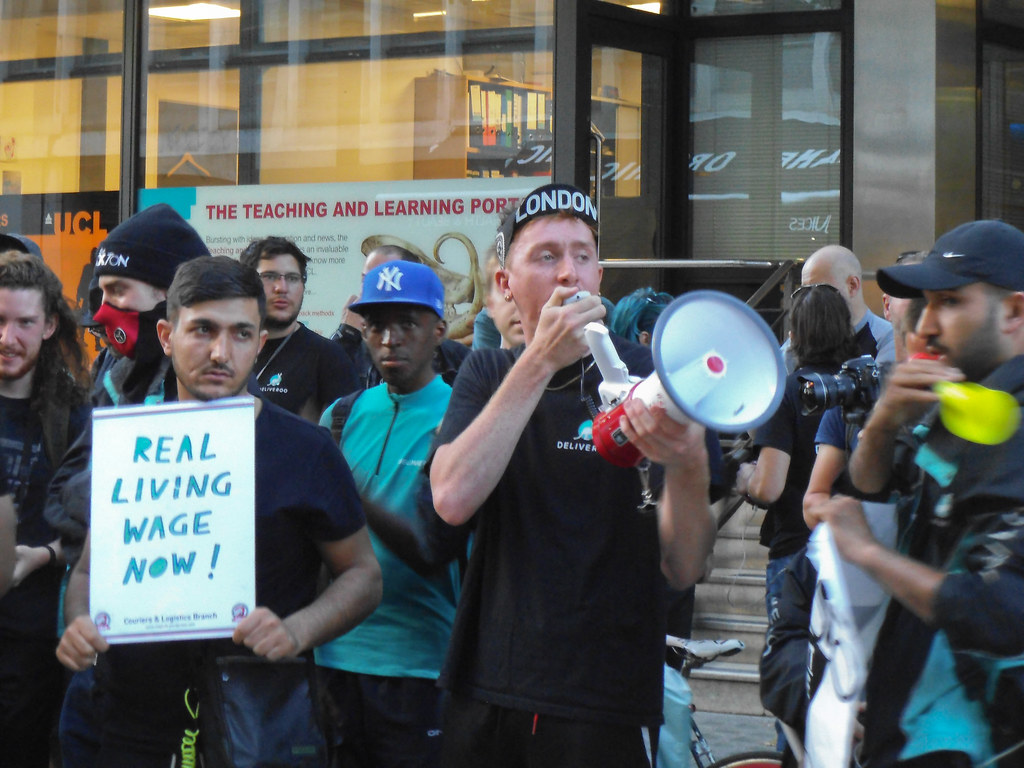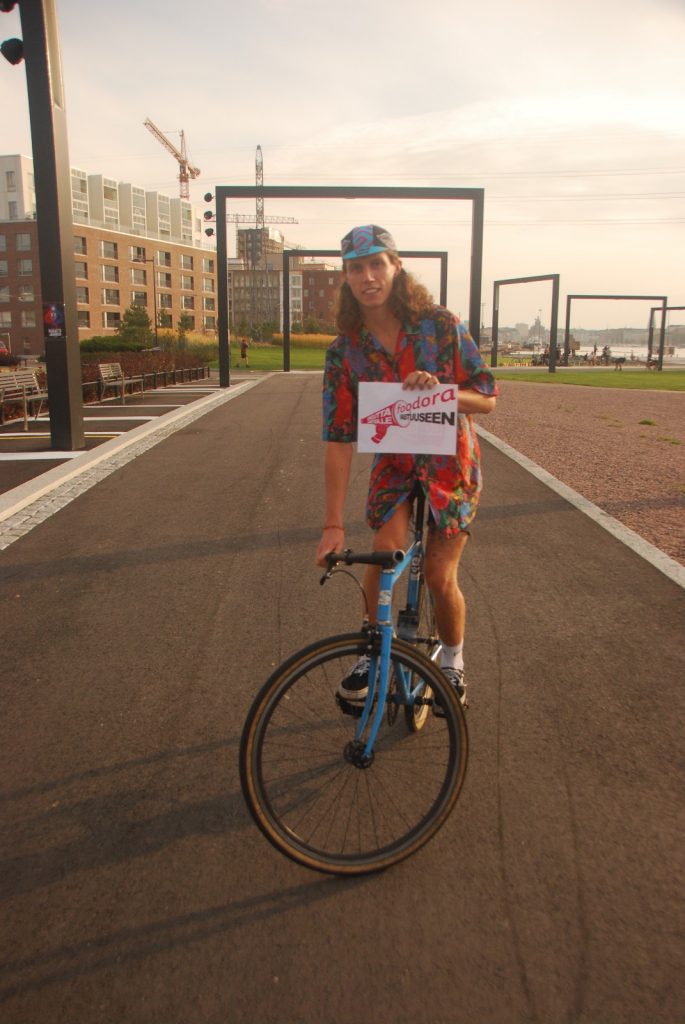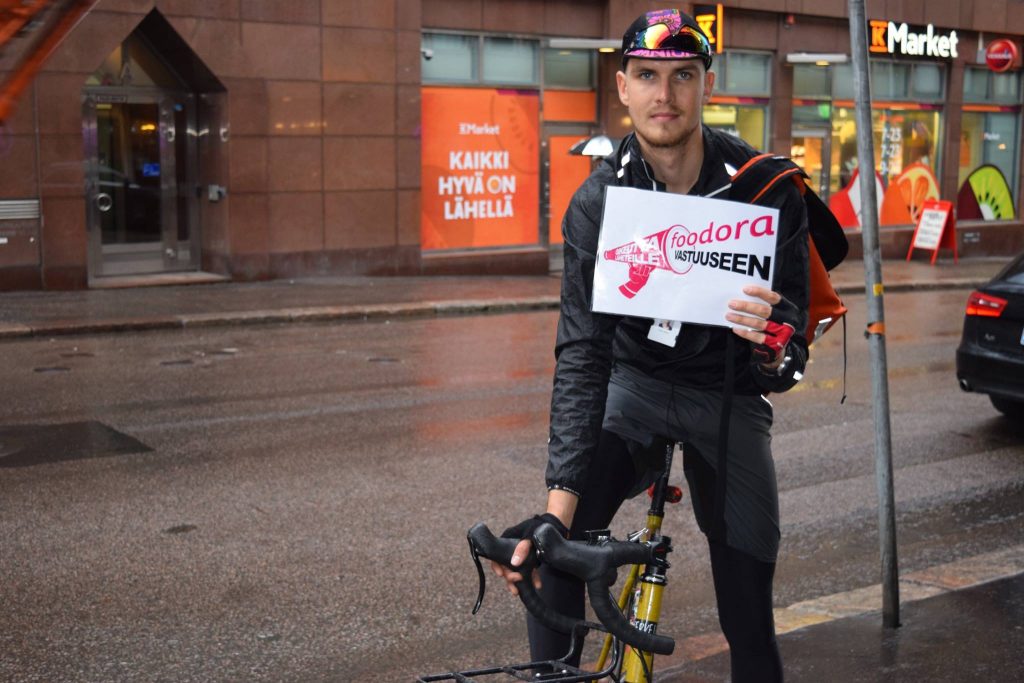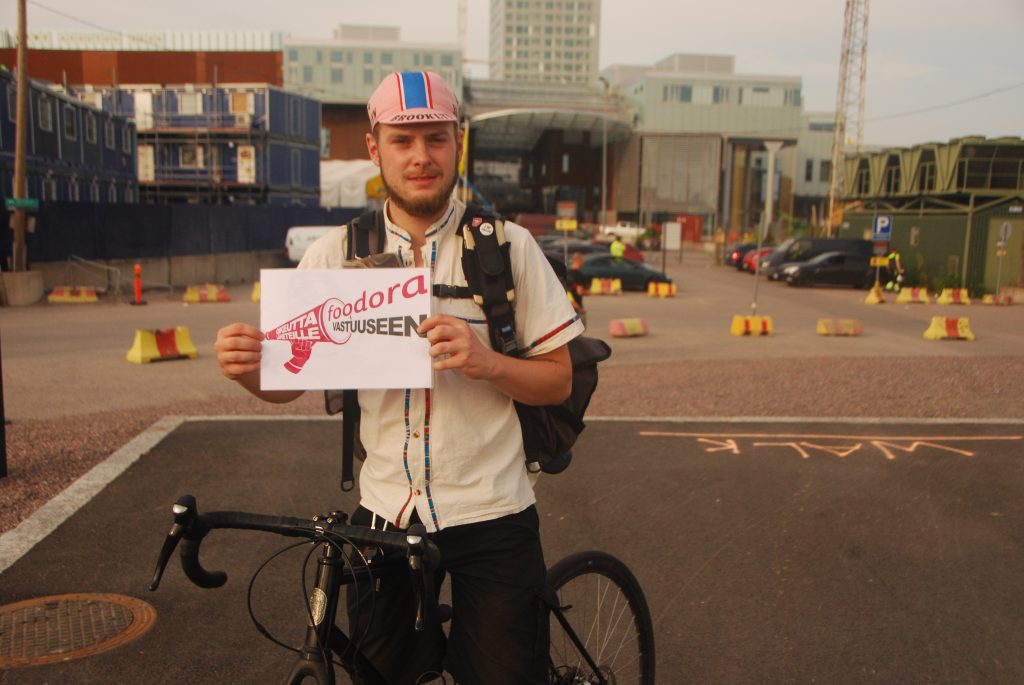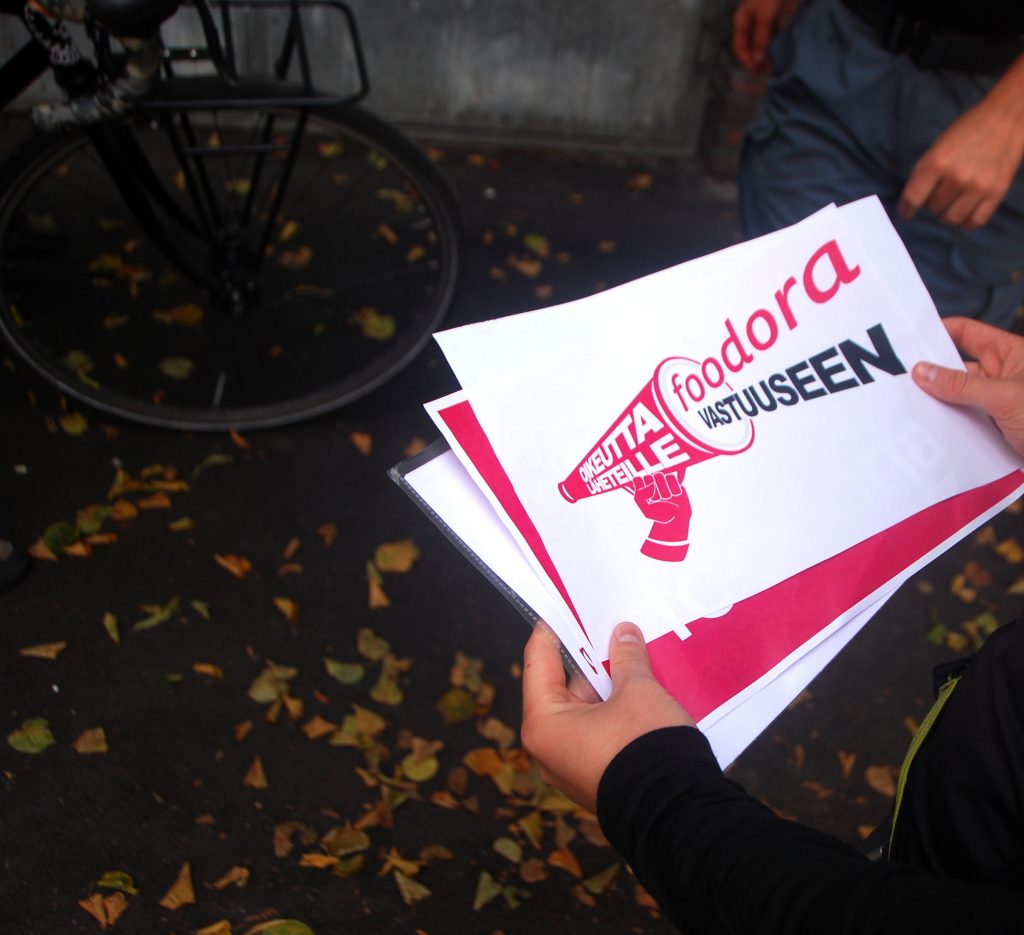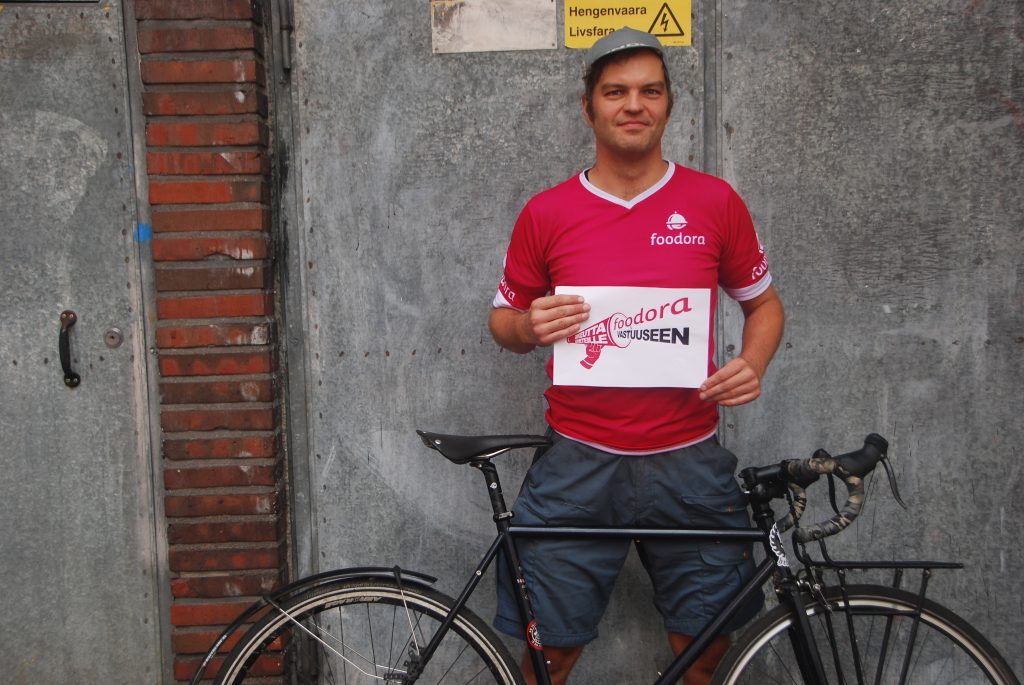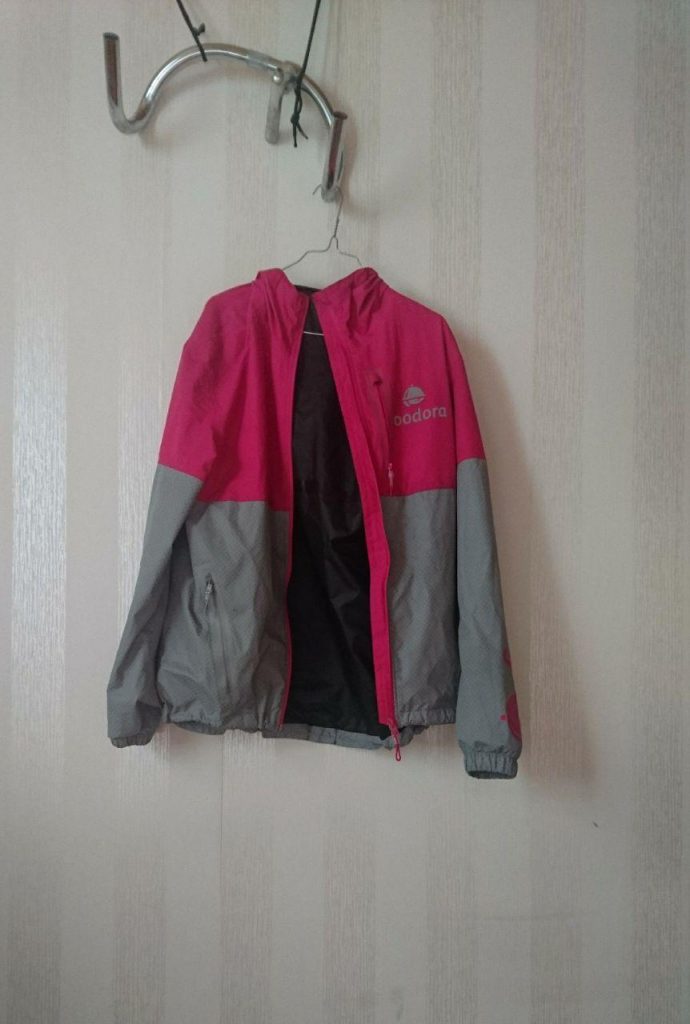
My shift today was a prime example of how the short-sighted decisions of Foodora show in practice.
I have been working for 5 months as a bike courier for Foodora.
My shift started at noon. The morning was really rainy but gladly at that point it wasn’t downpouring. Normally I would’ve waited at the Foodora office / courier hub for orders to start coming, but as the hub was closed due to “financial reasons” I waited at a park. If the weather is bad and business is slow then you seek shelter from a shopping center. To start their shifts, couriers must be within 1 km radius from the city center, so for many of us it’s not an option to wait at home.
I got my first task pickup half an hour later. I met one of the rider captains while waiting and asked them if I could change my gear at the warehouse. The jacket I got when I started at Foodora is ridiculously large and uncomfortable. You could only choose from large sizes, that’s all that was left. After closing the hub, the gear was stored in a storage unit. There’s a certain time – one hour – each week to change your gear at a warehouse. Also, there is no laundry option anymore, so you may have to wash the gear yourself (even the newcomers). Same goes with the backpacks. To ensure the food you carry stays germ-free, it would make a lot of sense to use a professional laundry service for the bags. The funniest thing was that the company’s paperwork was also stuffed in one of the boxes on the corner of the storage unit. The storage unit served as an office as well…
When my shift began, the first orders were as usual: some restaurants a bit late and some a bit early. Then at one point more orders started coming. I got a triple delivery, which is not common practice at Foodora – and as a cyclist you can only fit so much in your backpack. Of course, a triple would be a bit more profitable, IF you can fit the bags in your backpack, but even normal orders can be fairly large and stuffing them too tightly will cause the packaging to be be damaged and food may spill. Some restaurants use cumbersome packaging, which makes things even more interesting.
Anyway I asked the dispatcher to redirect the 3rd order, as I couldn’t fit it in. It took 3 messages and 10 minutes for them to react (once it took as long as 20 minutes for them to split an order!). By the time I would’ve been already on my way delivering the second order, but there I was waiting. You don’t see the next customer’s address in the app, so it’s impossible to make independent decisions. Finally they removed the order, I delivered the order and had to apologize the customer and explain the situation. Off to the second one, this time on the other side of the city. Again: I am sorry, the order is late, we’ve had problems with the system and it’s really busy.
Then I get a pick up of 6 kms to the exact opposite side of the city – and to get to this restaurant you climb a steep hill and ride it down. I asked the dispatcher if there were no car drivers available, because it’s absolutely stupid for cyclists to ride all the way there.
When Foodora decided to cut the expenses they removed the kilometer subsidies and free parking from cars, which obviously caused their number to decrease. To compensate the deficit, Foodora could’ve created delivery zones – which other cities have – but they didn’t. Long distance deliveries by bike make no sense neither for the couriers nor the customer.
Again, no answer from the dispatcher, so I figure I’d just go because probably they wouldn’t redispatch it anyways. When they finally replied they told me that it was so busy that it’s not possible to give the order to anyone else.
As a freelancer you should be able to refuse orders, but in practice you aren’t allowed to. If you do, they will discipline you and may even terminate your contract. This is an obvious contradiction between freelancer contracts and the demands set for the work.
When I arrived to the restaurant the order was already half an hour late. The delivery went even further. I pedaled nearly 8 kms from the previous customer to the next pick up and drop off. And then back to center, up the hill and down the hill. All in all it was a nice 13,5km task worth of mere 2,2 euros (and maybe 4e from my 7e/h salary).
Last tasks were reasonable and I was lucky to end my shift just when it started raining again.
I am privileged in this matter: when I started working as a courier two years back it wasn’t out of necessity but rather because I had dreamt for a long time to work in a bike-related job – preferably as a courier. For many of us there are no options. I have been able to choose when I work, and when I don’t, and to whom. Some have to take what they can get. The changes are especially harmful for those whose income solely depends on this work. When I started at Foodora they had barely any shifts left for batch 2 where the new couriers would start, so it felt like a lie recruiting us at that point. Right now the situation is better, but who knows what next week looks like… This is precarious work at its finest.
Physical work and carrying a large and sometimes heavy backpack is hard for your body, and you risk getting injured especially when the roads are slippery, when the tired rush-hour drivers are heading home, when pedestrians and cyclists don’t look around, and when you are in a hurry delivering already late orders. I like the independence and limited yet positive interactions with customers and restaurant staff. Sometimes you get a free pizza, sometimes a gift card (like today). Sometimes the restaurant workers are pissed off from seeing you in the wrong place.
The company should realize that its success is dependent on motivated couriers who take pride in doing their work well.
We need respect, we need justice! Foodora take responsibility!

